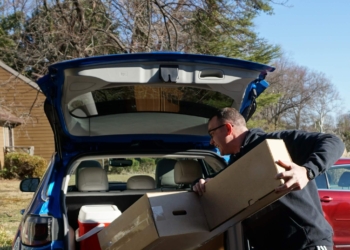With each set of PCS orders, I wonder whether we should consider a Personally Procured Move (PPM), which is the official name of what most of us call a DITY, or Do It Yourself move. It’s tempting — you hear stories of military families making tons of money, and it seems like there is less chance of damaged goods. If you’re considering a DITY move this PCS season, here are six questions you need to ask yourself:
How much reimbursement will you get?
For most people, the main reason to consider doing a DITY move is to make a little money. Before you get started, be sure you understand exactly what you will and will not receive, whether you do a DITY, a full government move, or something in between.
All service members who are executing PCS orders are entitled to a wide range of travel entitlements, including:
- temporary lodging,
- monetary allowance in lieu of transportation (technically called MALT, but often just called mileage),
- per diem for travel days,
- dislocation allowance.
When you do a DITY move or a partial DITY move, you’ll also get an allowance for moving your belongings, based upon the distance and weight moved. From that allowance, you pay all the expenses of the move: packing materials, hired help, the actual transportation of your goods, and unpacking. Any excess reimbursement beyond your actual expenses is taxable income.
Contact your personal property office to be sure you understand your entitlements and the reimbursement requirements for your branch, including when you need to have your vehicle weighed (empty/full/both? start/finish/both?).
Can you manage an upfront cost?
All branches have a process for getting an advance of a portion of your anticipated move reimbursement, but it doesn’t always work out as expected. If you decide to do a DITY move, you should plan to pay for all expenses out-of-pocket and expect that it may take months to be reimbursed.
Is moving yourself realistic?
Doing a DITY move is work, especially if you have a lot of stuff or heavy things like a piano or old-school entertainment center. Do you realistically have the time, mental energy and physical strength to pack up everything you own, load it safely onto a truck — or into a moving container — and unload it all on the other end?
Do you have a lot of professional gear?
One major limitation of a full DITY move is there is no way to separate out professional gear weight. Service members and their spouses are permitted to deduct the weight of certain specified work-related items from the overall weight of goods. Separating professional gear is a big help if you are close to your weight allowance.
Will you be able to keep track of the paperwork?
DITY moves require extra paperwork and receipts, particularly when you go to file your income tax return. You’ll need weight receipts to get reimbursed by the military — requirements may vary by branch. Then, because DITY reimbursements are taxable income, you’ll need all your expense receipts to deduct from your income.
TIP: Experienced DITY movers recommend a designated folder or envelope for receipts, but also taking a photograph of every single receipt when you get it. Upload the picture to the cloud to ensure you’ll always have access to a copy.
Have you considered a partial DITY?
One of the easiest ways to get the benefits of a DITY move without the work is to do a partial DITY, which separates your move into two parts. The government movers take care of the things you don’t want to move, and you get reimbursed for the portion you do move. A partial DITY is a good solution if you aren’t sure you want to do a full DITY, or if you have certain items you want to move yourself.
DITY moves are a good option for different situations, but they are a lot of work and they may or may not make money. Understanding the reimbursements and the process will help you decide if it is the right option for you.
Read comments






































